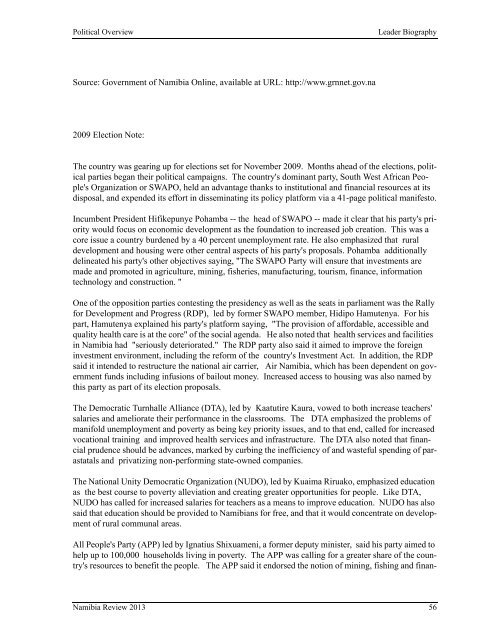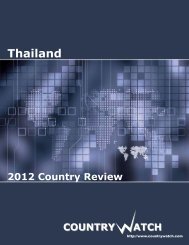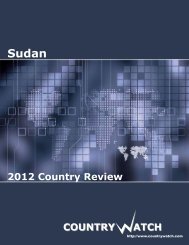Namibia - CountryWatch
Namibia - CountryWatch
Namibia - CountryWatch
Create successful ePaper yourself
Turn your PDF publications into a flip-book with our unique Google optimized e-Paper software.
Political Overview Leader Biography<br />
Source: Government of <strong>Namibia</strong> Online, available at URL: http://www.grnnet.gov.na<br />
2009 Election Note:<br />
The country was gearing up for elections set for November 2009. Months ahead of the elections, political<br />
parties began their political campaigns. The country's dominant party, South West African People's<br />
Organization or SWAPO, held an advantage thanks to institutional and financial resources at its<br />
disposal, and expended its effort in disseminating its policy platform via a 41-page political manifesto.<br />
Incumbent President Hifikepunye Pohamba -- the head of SWAPO -- made it clear that his party's priority<br />
would focus on economic development as the foundation to increased job creation. This was a<br />
core issue a country burdened by a 40 percent unemployment rate. He also emphasized that rural<br />
development and housing were other central aspects of his party's proposals. Pohamba additionally<br />
delineated his party's other objectives saying, "The SWAPO Party will ensure that investments are<br />
made and promoted in agriculture, mining, fisheries, manufacturing, tourism, finance, information<br />
technology and construction. "<br />
One of the opposition parties contesting the presidency as well as the seats in parliament was the Rally<br />
for Development and Progress (RDP), led by former SWAPO member, Hidipo Hamutenya. For his<br />
part, Hamutenya explained his party's platform saying, "The provision of affordable, accessible and<br />
quality health care is at the core" of the social agenda. He also noted that health services and facilities<br />
in <strong>Namibia</strong> had "seriously deteriorated." The RDP party also said it aimed to improve the foreign<br />
investment environment, including the reform of the country's Investment Act. In addition, the RDP<br />
said it intended to restructure the national air carrier, Air <strong>Namibia</strong>, which has been dependent on government<br />
funds including infusions of bailout money. Increased access to housing was also named by<br />
this party as part of its election proposals.<br />
The Democratic Turnhalle Alliance (DTA), led by Kaatutire Kaura, vowed to both increase teachers'<br />
salaries and ameliorate their performance in the classrooms. The DTA emphasized the problems of<br />
manifold unemployment and poverty as being key priority issues, and to that end, called for increased<br />
vocational training and improved health services and infrastructure. The DTA also noted that financial<br />
prudence should be advances, marked by curbing the inefficiency of and wasteful spending of parastatals<br />
and privatizing non-performing state-owned companies.<br />
The National Unity Democratic Organization (NUDO), led by Kuaima Riruako, emphasized education<br />
as the best course to poverty alleviation and creating greater opportunities for people. Like DTA,<br />
NUDO has called for increased salaries for teachers as a means to improve education. NUDO has also<br />
said that education should be provided to <strong>Namibia</strong>ns for free, and that it would concentrate on development<br />
of rural communal areas.<br />
All People's Party (APP) led by Ignatius Shixuameni, a former deputy minister, said his party aimed to<br />
help up to 100,000 households living in poverty. The APP was calling for a greater share of the country's<br />
resources to benefit the people. The APP said it endorsed the notion of mining, fishing and finan-<br />
<strong>Namibia</strong> Review 2013 56




